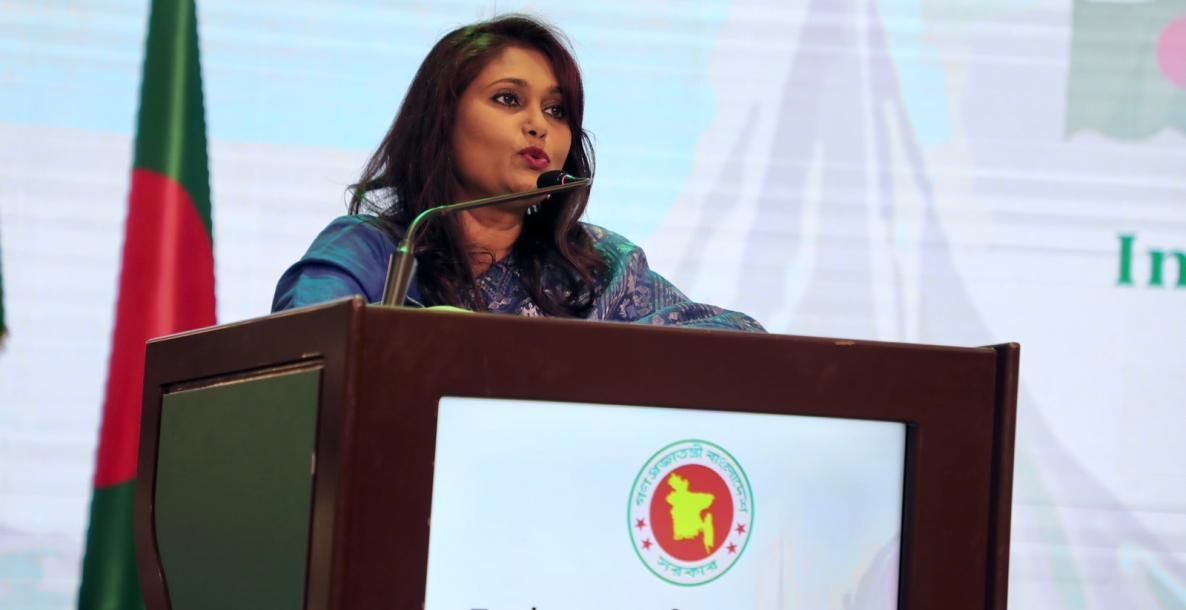Bangladesh High Commissioner to Canada Nahida Sobhan in an interview with the Dazzling Dawn said that the government of Canada has consistently supported the aspirations of the people of Bangladesh and recognized their pursuit of democratic and social justice. This support is rooted in a long-standing history of solidarity, including Canada’s significant backing during Bangladesh’s War of Independence in 1971.
The rest part of the interview is given below:
1. Bangladesh has got a new interim government, headed by Nobel Laureate Professor Dr Mouhammad Yunus. The student movement has toppled the previous Sheikh Hasina government . How the Canadian government and citizens see the revolution of student in Bangladesh?
The Government of Canada has consistently supported the aspirations of the people of Bangladesh and recognized their pursuit of democratic and social justice. This support is rooted in a long-standing history of solidarity, including Canada’s significant backing during Bangladesh’s War of Independence in 1971. The recent student-led movement against discrimination and the establishment of an interim government under Nobel Laureate Professor Dr. Muhammad Yunus have been highly viewed positively by Canada. The Canadian government issued a statement welcoming this transition as an essential step towards peace, inclusive governance, and democratic renewal. This commitment was further underscored during the meeting between the Chief Advisor and Canadian Prime Minister Justin Trudeau on the sidelines of the 79th UNGA, where they discussed youth development, institutional rebuilding, and the promotion of democratic governance.
2. Foreign direct investment (FDI) flow to Bangladesh suffered in 2023 as FDI recorded at 3.00 billion US dollars compared to 3.5 billion US dollars in 2022. Do you see more Canadian investment in Bangladesh, particularly in the power and energy sectors? How do you evaluate the investment climate in Bangladesh?
Several Canadian firms, including Brookfield, have shown interest in investing in our energy transition, particularly in the context of climate change. Canada’s Indo-Pacific Trade Representative led a trade delegation to Bangladesh very recently, signaling strong intent from the Canadian side to enhance business ties and investment. However, for substantial progress to occur, a Foreign Investment Promotion and Protection Agreement (FIPA) would be essential.
The initiation of FIPA negotiations marks a significant step toward attracting greater Canadian investment. The interim government is committed to structural reforms aimed at creating a more stable and conducive investment climate in Bangladesh. These reforms include improving economic performance by stabilizing exchange rates, controlling inflation, addressing arrears, maintaining capital account stability, asset recovery, and implementing banking reforms, including repatriation and bankruptcy laws. These measures are essential for building investor confidence.
3. Russia-Ukraine war has caused price hike of essential commodities in the world market. Poor and low-income group consumers are bearing the brunt of increasing prices of commodities in Bangladesh? How do you see the situation?
As this matter does not directly fall under my jurisdiction, I will refrain from commenting on it.
4. Bangladesh-Canada bilateral trade is hovering some 3.00 billion US dollars. What is our target to reach bilateral trade within the next five years?
Bangladesh aims to further elevate our trade relations with Canada with our strategic focus on trade diversification, expanding exports beyond the traditional readymade garments sector, and fostering economic resilience in line with the new government’s vision for sustainable growth. For this the High Commission is now focused on more business-to-business (B2B) meetings for promoting Bangladeshi products to enhance trade diversification. Both countries are working based on the recommendations from the Canada-Bangladesh Joint Working Group to identify and harness opportunities for enhanced economic cooperation.
5. What is the number of Bangladeshis living in your country? How do your government evaluate their contributions to your country? What is your present immigration policy now?
The official estimate states that there are over 100,000 Bangladeshis living in Canada, contributing significantly to the country’s diverse society and economy. Their roles span various sectors, including healthcare, engineering, academia, and entrepreneurship. The Bangladeshi diaspora has strengthened cultural ties and served as a bridge for deeper bilateral relations. Under the new interim government, which emphasizes empowering the youth and diaspora, Bangladesh is advocating for smoother immigration and student visa processes.
6. Can Canada recruit more skilled Bangladeshi manpower, especially doctors, engineers, and nurses?
There is great potential for Canada to benefit from skilled Bangladeshi professionals, including in healthcare sector. Since assuming the role of High Commissioner, I have been focusing on promoting opportunities for Bangladeshi professionals. Bangladeshi physicians also have opportunities in Canada; however, they must go through an extensive process, including passing the Canadian licensing exams, as per regulatory requirements.
7. Developing countries, including Bangladesh, are victims of climate change. How do Canada and Bangladesh work together on climate change issues? Do you think developed countries should give compensation to developing countries?
Bangladesh and Canada share a commitment to addressing climate change. The interim government in Bangladesh has prioritized environmental policies and international partnerships. The High Commission is working on leveraging Canadian IPS for joint climate resilience projects to address Bangladesh’s vulnerabilities. Collaborative efforts include joint projects, capacity-building programs, and knowledge-sharing initiatives aimed at enhancing Bangladesh’s climate adaptation capabilities. The need for developed countries to offer compensation or financial support to vulnerable nations is vital and aligns with principles of climate justice based on Common but Differentiated Responsibility Principle. As the Hon’ble Chief Advisor highlighted in his address to the 79th United Nations General Assembly, “What we need is climate justice – so that the irresponsible choices or, indifferent actions or, harms caused are accounted for.” Such financial support from developed nations will enable countries like Bangladesh to pursue effective resilience strategies without compromising their developmental goals.
8. The institutions of Bangladesh have been weakened over the last 20 years. Can Canada provide soft loans and support to strengthen these institutions?
Institutional building and governance reform are at the forefront of the new interim government’s priorities for stronger and more accountable institutions in view of the aspirations of people. Canada has shown interest in supporting these efforts through capacity-building programs.
9. The export basket of Bangladesh is heavily dependent on readymade garments. Can Canada help diversify the export basket of Bangladesh?
There is scope for diversifying our export basket in Canada beyond RMG. I have seen strong interest from the Canadian side in trade beyond RMG as well as within the service sector. To tap into this potential, Bangladeshi exporters must align their value propositions with Canada’s requirements.
Meanwhile, Nahida Sobhan, a career diplomat of 15th batch of BCS (Foreign Affairs) cadre, joined Foreign Service in 1995.
Since February 2020, she has been serving as Ambassador of Bangladesh to Jordan, with concurrent accreditation to Palestine and Syria.
She had served in Bangladesh Missions at Rome, Kolkata and Geneva in different capacities.
At the headquarters, she has held several important positions like Director General of UN and Human Rights Wing as well as Multilateral Economic Affairs Wing.
Nahida Sobhan obtained her Master of Arts degree in English Literature from the University of Dhaka.
She also completed several professional training courses both at home and abroad, and represented Bangladesh in numerous bilateral and multilateral meetings.
She is fluent in French, the foreign ministry said.








.svg)

